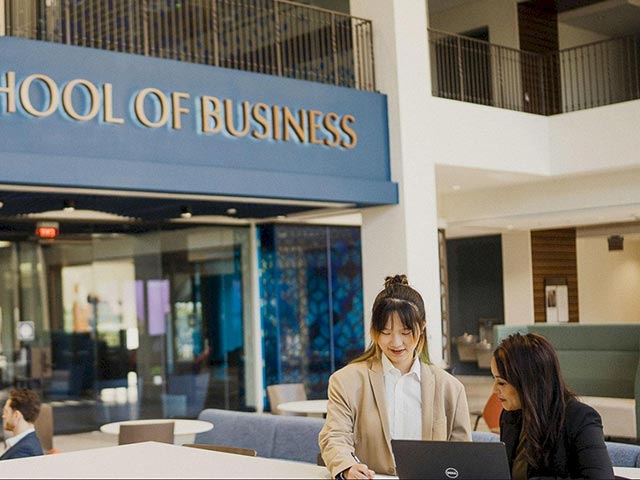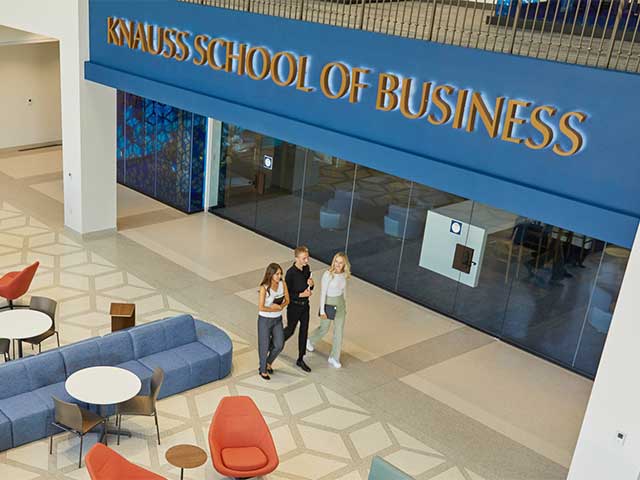The Future and Outlook of Supply Chain Management

Supply chain management has entered a new era—one where the focus is no longer solely on cost containment or operational efficiency, but on enabling adaptability, resilience and strategic growth. While supply chains have always influenced a business’s bottom line, they’re now shaping its top-line potential as well, from product innovation to brand reputation to sustainability leadership.
This shift didn’t happen overnight. It was catalyzed by global events, like COVID-19, geopolitical tensions, extreme weather, labor shortages and more, but it’s being sustained by something deeper: a structural transformation in how companies design and manage the flow of goods, information and relationships.
At the center of this transformation is a talent evolution. Tomorrow’s supply chain leaders won’t just be experts in logistics or procurement. They’ll be systems thinkers who can bridge technical knowledge with business acumen, and who understand that supply chains are not static pipelines, but dynamic ecosystems.
For a closer look at how these trends are shaping talent demands and how professionals are preparing to lead in this space, explore our resource on building a career in supply chain management, which offers a valuable perspective.
So, where is this field heading next? What disruptive forces are shaping its future? hat does that mean for careers?
Audio produced by Hubspot using AI narration.
Beyond Optimization: Why Supply Chain Strategy Is Being Rewritten
The fundamental question guiding supply chain design has shifted. Instead of asking, “What’s the most efficient way to do this?” companies are now asking, “What’s the most resilient, responsive and ethically sound way to do this—without sacrificing performance?”
That change reframes everything.
Instead of optimizing for a single global model, organizations are building multi-node, regionally diversified networks that can flex in response to uncertainty. That means professionals are now expected to analyze risk alongside cost and to weigh environmental and regulatory concerns as heavily as logistics.
The shift is also redefining what it means to add value. Supply chain professionals are expected to influence decisions on how products are designed for recyclability, how inventory is allocated to support omnichannel demand and how sourcing strategies align with Environmental, Social, and Governance (ESG) commitments. Their purview is expanding into areas like customer experience, investor confidence and corporate ethics, that were once considered adjacent.
This convergence of technology, sustainability, geopolitics and finance disciplines requires a much more interdisciplinary approach to leadership in supply chain roles.
Four Forces Reshaping Supply Chain Talent Demands
1. The Convergence of Digital Maturity and Strategic Complexity
Digital transformation in supply chains is no longer about basic automation or upgrading Enterprise Resource Planning (ERP) systems. It’s about integrating AI-driven forecasting, digital twins, real-time visibility platforms and advanced analytics into a system that not only reacts but anticipates. Companies with advanced digital supply chain capabilities are now statistically more likely to outperform their peers in both revenue growth and margin.
Employers aren’t just looking for familiarity with tools—they want professionals who can translate a model’s output into strategic decisions. For example, what scenario analysis does the digital twin suggest about a supplier shutdown in Vietnam? What hedging or sourcing options are worth presenting to the CFO?
In short, technical literacy is no longer optional, but neither is strategic fluency.
2. ESG Moves From Compliance to Strategic Leverage
In many industries, supply chains account for over 90% of total emissions. As a result, ESG accountability is increasingly falling on supply chain leaders, not just sustainability officers. Transparency in sourcing, carbon footprint reduction and labor rights due diligence are now critical responsibilities, not PR concerns.
The career opportunity here isn’t just in compliance. It’s in using ESG performance as a differentiator. Companies that can verify ethical sourcing and low emissions are better positioned for regulatory incentives, investor favor and consumer trust. That makes ESG-literate supply chain leaders invaluable.
3. Geopolitical Risk Becomes a Core Design Constraint
From U.S.–China trade volatility to war in Eastern Europe to semiconductor bottlenecks, global events have made one thing clear: sourcing is no longer a procurement decision—it’s a geopolitical one.
Tariff risks, cross-border regulations, cyber vulnerabilities and regional labor dynamics now shape everything from where to open a distribution center to which suppliers are considered strategically viable. Companies are investing heavily in supply chain risk modeling and hiring professionals who can navigate these variables in real time.
In this landscape, fluency in global policy is becoming as essential as knowing how to manage lead times.
4. The End of Globalization as Default
Rather than pursuing lowest-cost suppliers across continents, many organizations are rebalancing their networks toward regional sourcing, nearshoring and onshoring. The goal isn’t necessarily to bring everything home, but to build a portfolio of sourcing strategies that mitigate risk and increase responsiveness.
This shift is fueling demand for professionals who understand local supply chain infrastructure, regional logistics ecosystems and the hidden trade-offs of reconfiguring networks. It's no longer enough to be globally fluent, you have to be locally agile, too.
The Rise of Hybrid Supply Chain Roles
As the field evolves, so do the roles. What’s emerging is not just new job titles, but a new set of hybrid expectations that blend technical, strategic and ethical leadership. Here are a few examples where those intersections are most visible:
Supply Chain Analyst → Strategic Insights Architect
These professionals are no longer just generating dashboards—they’re expected to synthesize cross-functional data, identify actionable insights and drive continuous improvement. Think of them as internal consultants with a quant backbone. Skills in advanced analytics, machine learning and scenario modeling are key, but so is the ability to translate findings for executive audiences.
Sustainability & ESG Compliance Manager → Integrated Risk Leader
This role has expanded beyond tracking supplier certifications. It now involves mapping entire value chains for ESG risk, engaging with cross-border regulation (like the EU’s Corporate Sustainability Due Diligence Directive) and helping the company proactively position itself in an increasingly regulated global economy.
Procurement Strategist → Portfolio Architect
Procurement is shifting from transactional cost control to strategic portfolio management. Professionals in this space are balancing cost, ESG risk, geopolitical exposure and supplier innovation potential. It’s a more layered, future-oriented role that blends contract negotiation with long-term value creation.
Why a Master’s Degree Matters in This Climate
The modern supply chain isn’t a linear process; it’s a multidimensional system influenced by economics, technology, policy, consumer behavior and climate dynamics. Navigating that system effectively requires more than operational experience. It demands cross-disciplinary fluency and the ability to connect granular realities to enterprise-level strategy.
That’s where graduate education becomes a force multiplier.
A strong master’s program doesn’t just deepen your expertise, it reframes your perspective. It equips professionals to:
- Lead in uncertainty. With tools like scenario planning, dynamic modeling and risk analytics, you can move from reactive firefighting to proactive leadership.
- Bridge tech and strategy. Learning how to evaluate, implement and communicate the impact of digital tools, like AI forecasting or control tower platforms, gives you an edge in guiding transformation.
- Influence outcomes beyond the supply chain. Courses on ethics, sustainability and enterprise strategy prepare you to contribute to ESG targets, investor narratives and even product innovation.
The result? You’re not just advancing your knowledge. You’re future-proofing your career.
What to Look for in a Graduate Supply Chain Program
Not all supply chain graduate programs are designed for the complexity of what’s next. As the field continues to evolve, the most valuable programs will prepare you to lead—not just execute—within highly dynamic, tech-enabled environments.
Look for programs that offer:
- An integrated curriculum. The most effective leaders are those who can move between analytics, ethics, technology and strategy with ease. Programs that blend technical depth with a cross-functional perspective are best positioned to deliver that.
- Exposure to real-world tools and casework. Whether it’s AI forecasting, ESG audits or control tower design, understanding the tools shaping modern supply chains is essential. Practical, applied learning helps connect classroom insight with executive-level challenges.
- Faculty with industry depth and perspective. Instructors who bring a mix of academic rigor and practical experience can offer more than theories. hey bring the context that helps you apply them in high-stakes environments.
- A global and ethical lens. As supply chains become more regionalized and regulated, understanding global complexity while leading with ethical clarity will be a differentiator.
At the Knauss School of Business, USD’s supply chain management programs are designed with this balance in mind, preparing professionals not only to navigate disruption, but to lead through it. Courses emphasize systems thinking, sustainability, and data-driven leadership, all of which the field increasingly demands.
Opportunity Through Transformation: Earn Your Master’s in Supply Chain Management
The supply chain field isn’t just evolving—it’s being redefined. Business models are shifting. Expectations are rising. And professionals who can think beyond the silo, who can integrate data, technology, sustainability and strategy, are becoming essential to how organizations compete and grow.
For those looking to lead in this space, now is the time to build the mindset, skills and perspective that tomorrow’s supply chain careers demand.
To explore how these trends are reshaping roles, USD’s supply chain career guide offers a deeper look at where the field is heading and how to position yourself for what’s next.
Whether you're early in your journey or pivoting careers, we can help. Examine cutting-edge topics from strategy to sustainability, and explore how hands-on learning and networking opportunities from the Knauss School open doors.







